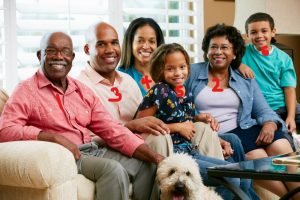Shona
Family in Shona
Shona Family
In Shona, family consists of the extended family, not just the nuclear. Family is an important unit among the Shona. Respect for the elders is paramount and they are consulted on all important matters.
Family Vocabulary
mwana/vana – child/children
mukomana – boy
musikana – girl
husband/man – murume
wife/woman – mukadzi
baba – father
amai – mother
mwanakomana – son
mukunda/mwanasikana – daughter
Mukoma– elder brother
hanzvadzi – sibling of the opposite sex – hanzvadzi sikana/sisi (sister), hanzvadzi konama/budhi (brother)
Munin’ina – younger sibling
sekuru – grandfather
ambuya/gogo – grandmother
babamukuru – older paternal uncle
babamunini – younger paternal uncle
sekuru- uncle/mothers brother
tete – aunt/father’s sister
amaiguru – aunt/mother’s older sister
amainini – aunt/mother’s younger sister
Counting in Shona
posi – one
piri – two
tatu – three
china/ina – four
shanu – five
tanhatu/nhanhatu – six
nomwe – seven
sere – eight
pfumbamwe – nine
gumi – ten
gumi neimwe – eleven
gumi nembiri – twelve
gumi nenhatu – thirteen
gumi nena – fourteen…
makumi maviri – twenty
makumi maviri ane imwechete – twenty-one
makumi maviri ane mbiri – twenty-two
makumi maviri ane nhatu – twenty-three
makumi maviri ane ina – twenty-four…
makumi matatu – thirty
makumi mana – forty…
zana – hundred
chiuru – thousand
Scenario: A man (3- Anesu) is introducing u to his family using a photo.
1 & 2 – his parents
4 – his wife
5&6 – his children

“Mhoroi! Ndinonzi Anesu. Ava ndi mhuri yangu. ava vari shanu. posi, ndaVaChoga, baba vangu. Piri, ndaVaMaria, amai vangu. Tatu, ndiini, Anesu. Ina, vaRevai, mukadzi vangu, Mai Anesu. Tine vana vaviri. Shanu, Danai, mwanasikana wedu. Nhanhatu, Tinashe, mwanakomana wedu. Danai isisi Tinashe. Tinashe ibudhi, Danai. Danai ndiye mukoma yaTinashe. Ndatenda/maita basa.”
“Hello all! My name is Anesu. This is (lit. these are) my family, they are five in number. One, Mr. Choga, my father. Two, Mrs Maria, my mother. Three, me. Four, Mrs. Revai, my wife, Mrs Anesu. We have two children. Five, Danai, our daughter. Six, Tinashe, our son. Danai is Tinashe’s sister. Tinashe is Danai’s brother. Danai is Tinashe’s older sibling. Thank you.”
Grammar notes: a case of three languages
Personal pronouns and their prefixes
While English does not have personal pronoun prefixes, Bantu languages do. They are highly agglutinative, having prefixes, suffixes, and cases of reduplication.
| Pronoun/prefix | Shona | Gĩkǔyǔ | Kiswahili |
| I | Ini/ndi- | Niĩ/ndĩ- | Mimi/ni- |
| We | Isu/ti- | Ithuĩ/tǔ- | Sisi/tu- |
| You (sing.) | Iwe/u- | Wee/ǔ- | Wewe/u- |
| You (pl.) | Imi/mu- | Inyuĩ/mǔ- | Nyinyi/m- |
| He/she | Iye/a- | We/a- | Yeye/a- |
| They | Ivo/va- | o/ma- | Wao/wa- |
Possessives
In Bantu languages, possessive are roots that have prefixes that show grammatical agreement, which is determined by the noun class of the subject/object.
| Possessive | Shona | Gĩkǔyǔ | Kiswahili |
| Mine | -ngu | -akwa | -angu |
| Our | -idu | -itǔ | -etu |
| Your (sing.) | -ako | -aku | -ako |
| Your (pl.) | -inyu | -anyu | -enu |
| His/hers | -ke | -ake | -ake |
| Their | -vo | -ao | -ao |

